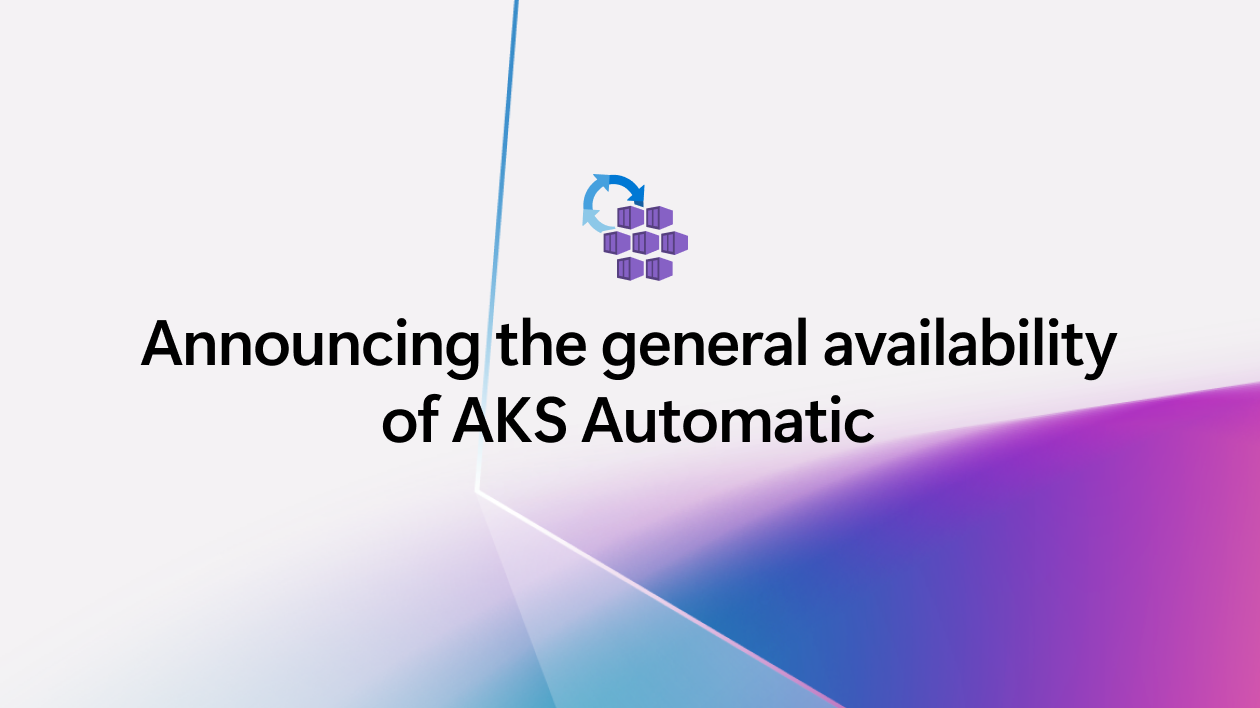Azure Kubernetes Service Automated helps groups go from decide to cloud with out friction, accelerating supply and unleashing innovation.
At present, I’m excited to announce the final availability of Azure Kubernetes Service (AKS) Automated, delivering Kubernetes that’s already configured, optimized, and able to run—proper out of the field. AKS Automated accelerates app supply with automation, simplifies Kubernetes operations by clever defaults, and permits safe, compliant workloads optimized for AI and cloud-native use instances. AKS Automated will set the usual for a simplified Kubernetes expertise.
As a substitute of wrestling with setup and operations, groups go from decide to cloud with out friction, accelerating supply and unleashing innovation. AKS Automated is the right steadiness between simplification and suppleness. By eradicating the complexity of Kubernetes infrastructure, it empowers groups to give attention to constructing and operating functions, whereas nonetheless preserving the extensibility and openness you count on from Kubernetes.
AKS powers mission-critical workloads for among the world’s most forward-thinking organizations, together with OpenAI, BMW, Hexagon, McDonald’s, and the NBA. Throughout industries, enterprises are leveraging AKS to scale securely and speed up innovation. AKS Automated builds on this trusted basis to make Kubernetes quicker, easier, and safer for each workforce.
Eradicating the “Kubernetes tax”
Even for essentially the most superior Kubernetes customers, the facility of the platform can usually include operational overhead. AKS Automated was constructed to take away these limitations by:
- Decreasing the training curve for brand spanking new Kubernetes customers. “Simple mode” clusters with best-practice defaults and guardrails simplify configuration and operations, whereas guaranteeing each app deployed on AKS has the efficiency, reliability, and safety it requires. Even first-time Kubernetes customers can have a dependable cluster up and operating, quick.
- Liberating up sources and lowering operational overhead. Working Kubernetes historically can imply sustaining the management aircraft, tuning node swimming pools, patching programs, dealing with upgrades, and scaling–all duties that may eat appreciable time and sources. AKS Automated offloads these day-two operations to Azure, managing your cluster’s infrastructure (node provisioning, scaling, upkeep, and repairs) robotically–releasing your workforce as much as give attention to different issues.
- Mitigating safety and reliability dangers from misconfiguration. Kubernetes flexibility could be a double-edged sword–a small mistake in setup can expose safety vulnerabilities or undermine reliability. AKS Automated clusters come safe and production-ready proper out –of –the field. They implement a hardened default configuration and Azure repeatedly patches and displays cluster elements to maintain them updated. This implies a stronger safety posture and resilient operations with out further effort.
From container picture to deployed utility in minutes, AKS Automated streamlines your complete Kubernetes expertise. With clever defaults, simplified cluster operations, and proactive safety inbuilt, groups are freed as much as give attention to constructing and operating functions, as an alternative of managing infrastructure.
The AKS Automated PoC has helped our Enterprise Tooling Platform considerably scale back operational overhead. By streamlining deployment and administration, it allowed us to focus extra on apps and instruments workloads fairly than infrastructure. We’re now planning to undertake AKS Automated as our ETP microservices and internet hosting platform for manufacturing.
—Swamy Asha, Answer Engineer at Royal Mail Group
What AKS Automated delivers
AKS Automated simplifies Kubernetes by providing a totally managed, opinionated expertise that abstracts away from infrastructure complexity, whereas holding the complete energy of Kubernetes at your fingertips. In sensible phrases, whenever you create an AKS Automated cluster, you get:
One-click, production-ready clusters. Spin up a production-grade cluster in minutes. Azure handles node setup, networking, and integrations utilizing greatest practices—no upfront selections required. Defaults like Azure Container Networking Interface (CNI) and Azure Linux nodes are preselected, so that you’re able to deploy instantly.
Clever autoscaling with out guide tuning. AKS Automated permits dynamic scaling for each pods and nodes utilizing Horizontal Pod Autoscaler (HPA), Vertical Pod Autoscaler (VPA), and KEDA for event-driven scaling–all enabled out –of –the field. It additionally introduces automated node provisioning by way of Karpenter, an open-source Kubernetes autoscaler that dynamically scales your cluster up or down based mostly on real-time demand—no guide configuration wanted.
Constructed-in greatest practices for safety and reliability. Each AKS Automated cluster is production-ready by default. This implies safety and reliability options are baked in from the beginning. You get Microsoft Entra ID integration for authentication, role-based entry management, and community insurance policies with out further setup. Node photos are patched robotically, and Azure Monitor is preconfigured for logs and metrics. Deployment safeguards assist stop misconfigurations that would impression uptime, whereas automated node repairs and built-in scaling guarantee your workloads run reliably. This implies you get a secure, safe cluster on day one.
Azure’s utility platform delivers flexibility in how clients need to scale AI Apps and brokers in manufacturing, from AKS to Azure Container Apps and Azure App Service. AKS Automated strengthens Azure’s place by making Kubernetes easier for all groups, accelerating deployment of AI functions and brokers and seamlessly integrating with Azure’s ecosystem of providers and developer instruments.
Kubernetes continues to attract huge curiosity from clients constructing new AI functions and brokers, in addition to these modernizing present functions and deploying at scale. Much more, we’ve embedded Microsoft’s experience operating Kubernetes at scale – underpinning Microsoft Groups, M365, Xbox Dwell and extra – instantly in AKS Automated configurations to boost safety, scalability, and efficiency.
Developer-friendly and absolutely extensible Kubernetes. Whereas AKS Automated handles infrastructure, it retains the expertise acquainted for builders and platform engineers. You continue to get the complete Kubernetes API, kubectl, and your present instruments all work as anticipated. AKS Automated integrates with CI/CD pipelines (e.g., GitHub Actions), enabling quick, repeatable deployments. If you want to customise one thing or use a particular Kubernetes characteristic, you continue to have the complete energy of Kubernetes at your fingertips.
A platform optimized for AI and cloud-native workloads. AKS Automated is purpose-built to help the calls for of contemporary functions, together with AI, ML, and cloud-native providers. It presents GPU help, clever workload placement, and dynamic useful resource allocation to deal with compute-intensive duties like mannequin coaching and inference.
Open-source alignment. Importantly, none of this comes on the expense of management or openness. AKS Automated is constructed on upstream open-source Kubernetes, and it stays 100% conformant with CNCF requirements (identical to AKS Commonplace). It leverages open-source initiatives like KEDA and Karpenter, staying true to the Kubernetes neighborhood whereas delivering a managed expertise.
Advantages for startups and enterprises alike
One of many distinctive features of AKS Automated is that it’s designed to be worthwhile to a variety of consumers.
For lean groups and startups, it makes Kubernetes possible even with out devoted DevOps or platform engineers. You get a “it simply works” Kubernetes cluster the place a variety of the difficult elements (like scaling, safety, upgrades) are dealt with for you. This implies a small workforce can leverage the facility of Kubernetes–flexibility, portability, scaling–with out getting slowed down in operations. As your wants develop, you continue to have all of the capabilities of Kubernetes out there.
For enterprise IT and platform groups, AKS Automated presents consistency and effectivity at scale. Enterprise platform groups can present AKS Automated clusters as a self-service choice to inner teams, and believe that these clusters can be safe and well-managed out of the field. It frees up skilled Kubernetes operators to give attention to higher-value structure selections fairly than routine cluster upkeep. And since it’s nonetheless AKS, it integrates with enterprise instruments like Azure Arc, Azure Monitor, and company-wide insurance policies simply in addition to normal AKS does.
In each instances, the end result is identical: groups can spend extra time on their functions and enterprise logic, and fewer time on Kubernetes itself. AKS Automated removes a lot of the undifferentiated heavy lifting that got here with Kubernetes, which implies extra developer productiveness and operational peace of thoughts.
Get began with AKS Automated
Getting began is as straightforward as deciding on the “Automated” possibility whenever you create a brand new AKS cluster. Within the Azure Portal, you’ll discover a toggle or SKU choice for AKS Automated throughout provisioning. With Azure CLI, you’ll be able to allow it by specifying tier Automated when making a cluster. There’s no separate product or new API–it’s the AKS you understand, with a brand new managed mode.
In case you’re thinking about studying extra or making an attempt it out:
- Prepared to start out specializing in innovation as an alternative of infrastructure? Be a part of us reside at this time for the world digital launch occasion of AKS Automated (or catch the recap)!
- Take a look at the documentation and quickstarts. Now we have up to date guides on Microsoft Be taught, similar to “Introduction to AKS Automated” which covers the way it works, and a quickstart for deploying an app to an AKS Automated cluster from a GitHub repository (utilizing our automated CI/CD integration). These sources stroll you thru the expertise step-by-step.
- Attempt changing a check workload. A good way to guage AKS Automated is to take a non-critical workload or a dev/check atmosphere you have got on a regular AKS cluster and deploy it to a brand new AKS Automated cluster. You’ll rapidly discover the variations in what you don’t should do (no guide node administration, and many others.), and you may observe the autoscaling in motion by placing some load on it. Because the Kubernetes API is identical, migrating an app is normally easy – usually it’s so simple as pointing your kubectl context to the brand new cluster and re-applying your manifests or Helm charts.
- Be a part of the neighborhood dialog. We’re keen to listen to from you–what works properly, what could possibly be higher, and what options you’d prefer to see subsequent. Kubernetes at scale is a journey, and GA is a milestone, not the top. As we transfer ahead, we’ll proceed to boost AKS Automated, guided closely by person enter. Join with our workforce on our Month-to-month Group Calls or on our GitHub.
Our workforce is thrilled to make AKS Automated typically out there and might’t wait to see how you employ it. Whether or not you’re a startup founder trying to scale your app with out hiring an ops workforce, or an enterprise architect aiming to standardize and simplify your organization’s Kubernetes footprint, we consider AKS Automated will allow you to obtain extra with much less problem. It’s Kubernetes, minus the complexity. We invite you to strive it out and tell us what you assume–and we sit up for a brand new wave of cloud-native innovation that AKS Automated will assist unlock.

